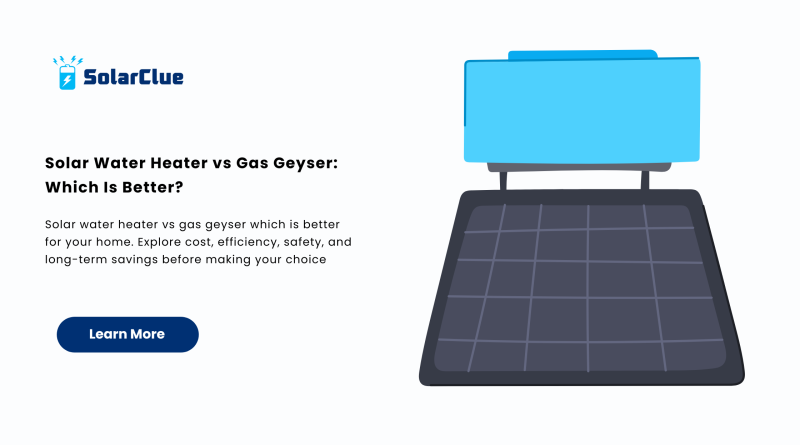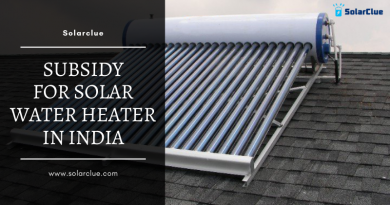Solar Water Heater vs Gas Geyser: Which Is Better?
Solar Water Heater vs Gas Geyser: Which Is Better? When it comes to heating water at home, two common options are widely considered—Solar Water Heaters and Gas Geysers. Both have their own advantages and drawbacks, but which one is truly the better fit for your needs? Whether you’re looking for the best solar water heater or trying to understand solar water heater efficiency compared to traditional heating methods, this guide will help you make an informed decision.
Let’s dive into a detailed comparison of solar water heater vs gas geyser, focusing on performance, cost, maintenance, safety, and environmental impact.
Table of Contents
How Does a Solar Water Heater Work?
A solar water heater uses energy from the sun to heat water. It typically includes solar collectors (panels), a storage tank, and sometimes a backup heater. The solar panels absorb sunlight and convert it into heat, which is transferred to water stored in the tank. This system is ideal for sunny regions and can work efficiently for 8–10 months a year without backup.
How Does a Gas Geyser Work?
A gas geyser runs on LPG or natural gas and uses a burner to heat water instantly. It’s a quick solution, often used in areas where electricity is unreliable. While it delivers hot water on demand, it also comes with recurring gas costs and potential safety concerns.
Performance and Heating Efficiency
-
Solar Water Heater Efficiency: Modern solar heaters offer around 60–70% thermal efficiency, depending on sunlight availability and the model. Some high-end units with vacuum tube collectors perform well even in low sunlight.
-
Gas Geyser Efficiency: Gas geysers provide instant heating but have lower thermal efficiency (40–50%) and heat loss can occur if used irregularly.
Verdict: If you’re looking for energy efficiency and long-term savings, the solar water heater has the upper hand.
Cost Comparison: Initial & Running Costs
| Parameter | Solar Water Heater | Gas Geyser |
|---|---|---|
| Initial Cost | ₹20,000 – ₹60,000+ | ₹3,000 – ₹10,000+ |
| Running Cost | Almost zero (uses sunlight) | High (needs regular gas refills) |
| Payback Period | 3–5 years | No ROI (recurring fuel cost) |
| Government Subsidy | Available (30–60% in many states) | Not applicable |
Verdict: While gas geysers are cheaper initially, a solar water heater for home becomes more cost-effective in the long run due to zero fuel costs.

Maintenance and Lifespan
-
Solar Water Heater: Minimal maintenance is needed. Regular cleaning of the panels and checking for leaks is enough. Lifespan is around 15–20 years.
-
Gas Geyser: Requires regular maintenance for burner and gas line safety. Typical lifespan is 5–8 years.
Verdict: The best solar water heater wins again with lower maintenance and a longer lifespan.
Safety and Environmental Impact
-
Solar Water Heater: Completely safe, uses renewable energy, and reduces your carbon footprint.
-
Gas Geyser: Involves fire risk, gas leaks, and carbon monoxide emissions if not properly ventilated.
Verdict: Solar water heaters are safer and environmentally friendly.
Availability of Hot Water
-
Solar Water Heater: Depends on sunlight. Most models store hot water for use throughout the day. Some may require electric/gas backup during cloudy weather.
-
Gas Geyser: Provides hot water instantly, anytime.
Verdict: Gas geysers offer convenience, but solar heaters can also provide round-the-clock hot water with proper backup.
Space Requirement
-
Solar Water Heater: Requires space on the rooftop to install panels and the storage tank.
-
Gas Geyser: Compact and fits easily in a bathroom or kitchen wall.
Verdict: If roof space is not a constraint, go for the solar water heater for home; otherwise, a gas geyser is easier to fit in tight spaces.
Which Is Better for Your Home?
Choose a solar water heater if:
-
You live in a sunny region.
-
You want lower electricity or gas bills.
-
You prefer an eco-friendly, long-term solution.
-
You have space on your rooftop.
Choose a gas geyser if:
-
You need instant hot water on demand.
-
You have limited roof space or live in a rented home.
-
You live in areas with frequent cloudy weather.
FAQs
Q1: Is a solar water heater better than a gas geyser?
A1: Yes, in terms of efficiency, safety, and long-term cost, a solar water heater is a better option for most homes.
Q2: Can I use a solar water heater during the monsoon?
A2: Yes, most systems come with electric or gas backup to ensure hot water even on cloudy days.
Q3: How long does a solar water heater last?
A3: A quality solar water heater for home can last 15 to 20 years with minimal maintenance.
Q4: Is the water from a gas geyser safe for bathing?
A4: Yes, but make sure the unit is properly maintained and ventilated to avoid carbon monoxide exposure.
Q5: Do solar water heaters save money?
A5: Absolutely. Though the upfront cost is higher, the solar water heater efficiency ensures significant savings over time with almost no operating cost.
If you’re looking for a cost-effective, safe, and eco-friendly solution to your hot water needs, the solar water heater is the clear winner in most scenarios. It’s an investment that pays off in the long run while contributing to a cleaner planet.
Want help choosing the best solar water heater for your home? Visit 👉 solarclue.com and explore more expert comparisons and guides at 👉 blog.solarclue.com. Let’s heat your water, the smart and sustainable way!




